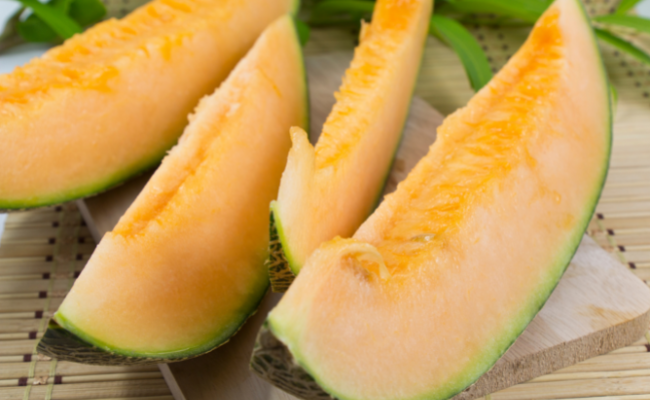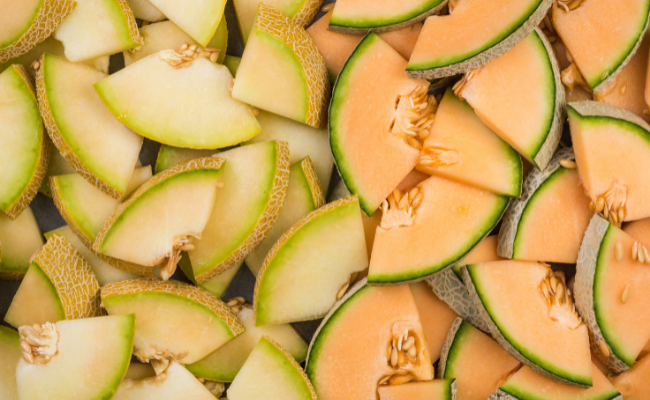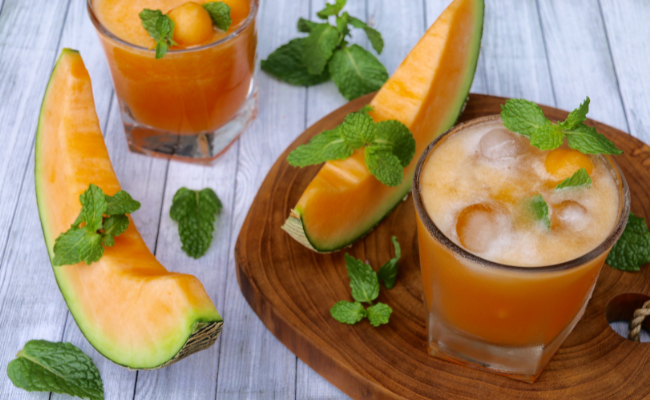Muskmelon vs. Cantaloupe: What’s the Difference?
Are you a fan of refreshing summer fruits? If so, you’re probably familiar with muskmelon and cantaloupe – these sweet, juicy melons are a staple at pool parties and BBQs.
And while they’re often used interchangeably, some people claim they’re two different fruits. Well, let’s clear things up!
In this article, we’ll take a closer look at cantaloupe and muskmelon to figure out what makes them unique.
You’ll learn all about their flavors, textures, and appearance and tips for showcasing them at your next barbecue. So let’s get started!
What is Muskmelon?
They are part of the same family as watermelons (Cucurbitaceae family) and species (Cucumis melo) and are known for their delicious flavor and impressive health benefits.
You may also know them by their alias in supermarkets: “cantaloupe,” which is the name of a specific variety of muskmelon.
These fruits are packed with goodness, thanks to their high water content and impressive nutritional profile. They’re a great source of vitamin A and beta-carotene, which can help improve your vision.
Plus, muskmelons are full of vitamin C and are also a good source of potassium. It is important for maintaining healthy blood pressure and supporting muscle function.
In addition to their nutritional benefits, they are also great for adding flavor and texture to a variety of dishes.
You can munch them on their own as a refreshing snack, use them in salads and smoothies, or even grill them for a tasty twist.
What is Cantaloupe?
Remember how we said earlier that cantaloupes are an alias for a particular type of muskmelon? Yes, “cantaloupe” refers to a specific variety grown for commercial sale in the USA.
Some often use them interchangeably because supermarkets commonly sell both of them as cantaloupes.
In other words, when you see cantaloupes in the store, they are actually muskmelons. However, not all of them are cantaloupes!
The North American cantaloupe we commonly see in the United States aren’t actually “real” cantaloupes.
The “real” cantaloupe, also known as the European cantaloupe, has a harder rind and a more subtle, sweet taste.
It’s a bit harder to grow and is less commonly present in the US, but it’s still full of all the same health benefits as its cousin.
So the next time you’re munching on a cantaloupe, remember that you’re actually eating a muskmelon.
Cantaloupes are high in vitamins and minerals, including vitamins A, C, and K. It is also high in potassium and folate.
These nutrients are important for maintaining good health and can help support the immune system and improve skin health.
They’re also low in calories and high in water content, which can help to keep you hydrated and can also help to support weight loss efforts.
Cantaloupe vs. Muskmelon
They are both types of melon that are round or oblong in shape and have thick, rough outer skin. However, they are different varieties of melon and have some distinct differences.
Cantaloupe is a type of muskmelon that mostly grow in Europe. It’s also well-known as rockmelon or sweet melon.
It has sweet, orange flesh, and its skin is typically rough and bumpy with a pale green or tan color.
These melon fruits are a variety of melons that originated in Persia and are commercially grown in the US in different varieties like honeydew or nutmeg melon.
The Persian melon has sweet, juicy flesh that is usually white, green, or pale yellow in color, and its skin is typically smooth and shiny with a green or pale yellow color.
In general, cantaloupes have a more fragrant aroma and a sweeter taste than other types of melons. Muskmelons, on the other hand, have a less pronounced aroma and a milder flavor.
Both types of melon are good sources of vitamins and minerals, and you can use them in a variety of dishes.
When to Use Muskmelon vs. Cantaloupe
You can eat both cantaloupe and muskmelon fresh as a healthy snack or in a fruit salad or dessert. You can also use them in various dishes, such as smoothies, sorbets, and chilled soups.
In general, cantaloupe is a good choice when you want a sweet, fragrant melon with juicy, flavorful flesh.
Ripe cantaloupes are often the ingredients in fruit salads, desserts, or as a refreshing snack on a hot summer day.
Muskmelon is a good choice when you want a milder-flavored melon with a less pronounced aroma.
Many used it often in fruit salads, smoothies, and other dishes with preferences for subtle, sweet flavors.
It ultimately comes down to personal preference in terms of which type of melon you prefer to use.
Conclusion
There’s a good chance your grocer uses muskmelons and cantaloupes interchangeably, so you can too. After all, the chances of finding a “real” cantaloupe aren’t that high.
These are two delicious and nutritious types of melon that are perfect for adding some sweetness and refreshment to your meals and snacks.
They are bursting with vitamins and minerals and are low in calories and high in water content, making them great for keeping you hydrated and helping you to maintain a healthy weight.
You can enjoy them on their own or when you add them to various dishes, so why not try and see which one you like best?




